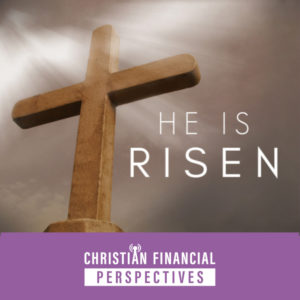Click below to listen to Episode 30 – He Is Risen
Subscribe: Apple Podcasts | Google Podcasts | Spotify | Amazon Music | Stitcher | RSS | More
He Is Risen
Here at Christian Financial Perspectives, Easter is an important holiday to us because it represents the resurrection of our Jesus Christ. Bob and Mary Jo wanted to offer some insight into the Easter story and how it relates to money.
Did you know that one of the best storytellers was Jesus? He taught with messages of hope and love through his parables. His parables are great tools, even in today’s world, for learning valuable lessons. In today’s episode, Bob and Mary Jo present different financial teachings of Jesus taught through his resurrection.
HOSTED BY: Bob Barber, CWS® and Mary Jo Lyons, CFP®
Mentioned In This Episode

Mary Jo Lyons, CFP®, CKA®
Want to ask a question about your specific situation? Schedule a complimentary 15 minute phone call.
EPISODE TRANSCRIPT
[INTRODUCTION]
Bob: Welcome to Christian Financial Perspectives, a weekly podcast where we talk about ways to integrate your faith with your finances. This is Bob Barber.
Mary Jo: And I’m Mary Jo Lyons.
Bob: Are you ready to learn how to apply biblical wisdom to everyday financial decisions?
Mary Jo: Join us as we look at integrating your faith with your finances. If it’s your first time listening, welcome to our podcast, and if you’re a returning listener, welcome back.
[EPISODE]
Mary Jo:
Bob:
Matthew 28:6. “He is not here. He is risen just as he said. Come and see the place where he lay.” As we move through this Lenten season and prepare for the resurrection of Christ Jesus, we wanted to offer some insight into the Easter story and how it relates to money today on Christian Financial Perspectives. We’re calling this episode, “He Is Risen.”
Mary Jo:
Here on Christian Financial Perspectives. We look at what God’s word says about money. Even the Easter story shares some perspective on money that we can learn from. We all love a great story, don’t we, Bob?
Bob:
Mary Jo, we do. In fact, one of the best storytellers of all time was Christ himself. He touched people with a message of hope and love. He spoke so many times through parables that he shared in his teachings. Many people today don’t think that these stories are relevant to today’s complex world, but I guarantee they are. That’s just simply not true. They’re very relevant to today. The parables are great tools to illustrate common, even economic, concepts and real world life issues that are as true today as they were back in Jesus’ time. Jesus used simple stories from these parables to tell truths in a way that people could understand and relate to.
Mary Jo:
Why Jesus used stories. This is explained for us in Matthew 13:10-17, “Later when Jesus was alone with the 12 disciples and with the others who were gathered around, they asked him what the parables meant. He replied, ‘You are permitted to understand the secret of the kingdom of God, but I use parables for everything I say to outsiders so that the scriptures might be fulfilled. When they see what I do, they will learn nothing.
Bob:
When they hear what I say, they will not understand. Otherwise, they will turn to me and be forgiven. Then Jesus said to them, if you can’t understand the meaning of this parable, how will you understand all the other parables?'” That’s very interesting that he asks that.
Mary Jo:
Yes. Bob, I was preparing for the show. I came across this story of a man who was watching some kids play a baseball game. The thing about spring is it’s Easter season and time for much celebration, but it’s also the beginning of baseball season. So, what would a story be without a baseball analogy? And as a big Astros fan, I couldn’t help but laugh at this particular one. He yelled out at the kids in the right field. “Who’s winning?” “They are.” “What’s the score?” he asked. “17 to nothing.” The man said to the kid, “It doesn’t look too good for you, does it?” The kids smiled and said, “Well, no, sir, but we haven’t been up to bat yet.”
Bob:
I love it. That’s optimism. That is optimism when you hadn’t even been up to bat yet, but the other team has already scored 17 on ya. But that is a great story about hope. That kid was out there in the outfield. And he’s like, well, we’re going to get up and bat, we’re going to score 17 or 18. We’re gonna score 18. But that kid was kind of speaking in parables of sort. Wouldn’t you say?
Mary Jo:
I certainly would. I think this is a great example.
Bob:
So as we approach this Easter season, it’s important to remember that this gives us reason for hope. Christ is risen and Christ will come again. Amen. Just like the baseball story. There’s so much hope in this. I say what a day that will be for all of us, that know Christ as our personal Lord and savior, when we see Jesus in heaven and when he returns to reign here on earth as our King. But in the meantime, there is some days of darkness and we may be discouraged and get discouraged. Maybe we wonder where the world is headed sometimes with the things we see around us in the news and internet and media. But I know this, as Christians that is only temporary. So have no fear. The kingdom wins as John 16:33 says, “I’ve told you these things so that in me, you may have peace. In this world, you will have trouble, but take heart. Christ has overcome the world.” I have overcome the world is what Christ said.
Mary Jo:
This is what we try to do here on Christian Financial Perspectives. We take today’s financial issues and tie them back to biblical messages that relate to money and wealth. If you’ve been listening to the show, you’ve heard us say many times the Bible has much to say about money and managing wealth.
Bob:
So, Mary Jo, let’s get into a little bit of that. Here we are in the Easter season, we know that Judas is a big part of that. We’re going to look at the story of Judas, as an example, and what the Bible tells us about money and wealth.
Mary Jo:
In Matthew 27, we look at the story of Judas, “Very early in the morning, the leading priest and the elders of the people met again to lay plans for putting Jesus to death. Then they bound him, led him away, and took him to pilot, the Roman governor.”
Bob:
“When Judas, who had betrayed him, realized that Jesus had not been condemned to die. He was filled with remorse. So he took the 30 pieces of silver back to the leading priests and the elders. ‘I have sinned,’ he declared, ‘For I have betrayed an innocent man.’ ‘What do you care?’ They said back. ‘That’s your problem.'”
Mary Jo:
“Then Judas threw the silver coins down in the temple and went out and hanged himself.”
Bob:
“The leading priests picked up the coins. ‘It wouldn’t be right to put this money in the temple treasury,’ they said, ‘Since it was payment for murder.’ After some discussion, they finally decided to buy the potter’s field and they made it a cemetery for foreigners.”
Mary Jo:
“That’s why the field is still called the field of blood. This fulfilled the prophecy of Jeremiah that says they took the 30 pieces of silver, the price at which he was valued by the people of Israel,` and purchased the potter’s field as the Lord directed.”
Bob:
So as we look at this passage, there are many theories about why Judas betrayed Jesus as master. Most people think he was motivated by greed. Some say he was possessed by the devil. I say that one. And some say he was just chosen to fulfill prophecy, but much has been written about this story as it leads to Christ’s resurrection. But the wisdom behind this is that Judas did have a love of money. So, Mary Jo, this is really interesting as we look at this next scripture from Acts 1 about the money that Judas threw back at the Pharisees and the chief priest, that 30 pieces of silver that they’re like, wait. This is not our money. This is blood money. So they took that money that Judas gave them and went and bought that field. Let’s look at this next scripture about what happened with the money that the chief priests took back from Judas to buy that field.
Mary Jo:
In Acts 1:18-19, “With the reward he got for his wickedness, Judas bought a field. There he fell headlong, his body burst open and all his intestines spilled out. Everyone in Jerusalem heard about this. So they called the field in their language field of blood.” The additional detail we learn is that after Judas hung himself, his dead body fell into the field purchased with his ill gotten gains.
Bob:
So what do you think this tells us about ill gotten gains?
Mary Jo:
Well, in Proverbs 1:19, “Such is the fate of all who are greedy for money, it robs them of life.” So I think Judas lost his life.
Bob:
Yeah, that’s definitely what happened. Greed got ahold of him, and there’s even more about greed in relationship to the crucifixion where the report of the guards and Matthew 28:11-15. So, if you would read that passage for us.
Mary Jo:
“As the women were on their way, some of the guards went into the city and told the leading priests what had happened. A meeting with the elders was called and they decided to give the soldiers a large bribe. They told the soldiers you must say, ‘Jesus’s disciples came during the night while we were sleeping and they stole his body.’ If the governor hears about this, he’ll stand up for you so you won’t get in trouble. So the guards accepted the bribe and said what they were told to say. Their stories spread widely among the Jews, and they still tell it today.”
Bob:
It seems like under other circumstances, the soldiers would have been afraid to say that all four had been sleeping on duty.
Mary Jo:
That wouldn’t have gone over too well.
Bob:
But they were greedy. Mary Jo, I think it’s interesting that in the scripture of Matthew 28:11-15, that you just read, bribe appears a couple of times in there. The soldiers took a large bribe, they accepted the bribe, the guards did. So, this was really a story about bribery.
Mary Jo:
It seemed to be a common practice those days.
Bob:
Yeah. It was like, hey, we’ll bribe you to say this, even though that’s not what really happened. So this is a very, very good part. We’ve got to take this scripture and really absorb it – again, that’s Matthew 28:11-15 – to see what was going on here and how there was all this bribery going on to make everything the way they wanted to say it. Does that make sense?
Mary Jo:
Sure. And I think that the soldiers knew they were in trouble, and it really didn’t matter because they’re going to be in trouble either way.
Bob:
Exactly. I mean, what if you were sitting there and you saw a rock roll back. Here comes Christ out, resurrected, and all these angels. I mean, man, that’s some scary stuff, and they knew their flesh was on the line. I mean, they could get killed for this.
Mary Jo:
Greed is the undoing of many a good soldier in the Bible. The Bible speaks to this on numerous occasions. A great example of that is in 1 Timothy 6:9, “Those who want to get rich fall into temptation and a trap and into many foolish and harmful desires that plunge people into ruin and destruction.”
Bob:
I think this is a good example. We’ve shared this many times on Christian Financial Perspectives that we’ve gotta be careful about how that money can cause us to fall into temptation because God’s word gives us wisdom about what to do, when to do it, and how to gain spiritual victories in the midst of chaos. And this definitely includes your financial life. Joshua 1:7 is another good one in the Old Testament, “Only be strong and very courageous, be careful to do according to all the law which Moses my servant commanded you. Do not turn to the right or to the left so that you may have success wherever you go.” In other words, stay on that straight path.
Mary Jo:
We are called upon not to be passive, but to be proactive for the cause of Christ. And when we do that, it requires commitment and discipline. I was reading a recent devotional from pastor Jack Graham recently. And he talks about how the Christian life is a marathon, not a 100 yard dash. The Christian life is not to be lived in spurts and jumps and stops and starts, but it is to be lived like a great race or running to the finish line.
Bob:
Mary Jo, it’s like running a marathon. The Christian life requires discipline not based on emotions, but faith, because we’re in a constant, cosmic battle between good and evil and wanting to do it our own way versus God’s way.
Mary Jo:
You’re right, Bob. We’re in a war. We’re in a race, and the bullets are real. The casualties are high. Endurance is required to finish the course and to run the race. The Bible says to run that we might win, and this includes your financial life and preparing for your financial future. So it’s a marathon, it’s not a sprint. And it does require discipline for your financial life to get to the goals that you want. This is where working with a trusted financial advocate comes in, and it’s been shown that ongoing financial planning can pay off in many ways. So, there has been an industry study that estimate that financial advice can actually add between 1.5% – 4% to account growth over extended periods. I think that in itself tells us a lot about how much working with a trusted financial advisor can really help you.
Mary Jo:
This caught my attention because I think that it’s very impressive. This study comes from several very key financial institutions, and they all did their version of this study. And those sources include: “Investnet Capital Sigma – The Return on Advice.” This estimates advisor value adds an average of 3% per year and was completed in 2016. Russell Investments did a value of an advisor study in 2017 titled “Why Advisors Have Never Been So Valuable”. Their estimates value add it more than 4% per year. Vanguard – “Putting a Value on Your Value, Quantifying Vanguard’s Advisors Alpha” done in 2016. Their study estimates lifetime value can add an average of 3%. Morningstar Investment Management’s study was entitled “The Value of a Gamma Efficient Portfolio” and was completed in 2017. So, these are some pretty key names in our industry. I think that was something our listeners would really want to pay attention to you. Don’t you Bob?
Bob:
Yeah, I liked the part, and I want to repeat that, that financial advice might add between 1.5% and 4% to account growth over extended periods. I think you know why. It’s because plans fail from lack of counsel, but with many advisors they succeed, and we help in those emotional decisions, just like we were talking earlier about that. Our Christian walk should be based on faith, not emotions.
Mary Jo:
As should your financial life. We have talked about how the Christian life is a battle between good and evil. Our financial life is a battle, too. It’s a battle between our wants, our desires, our needs, and our future financial requirements. So, we have to balance that. And I think that’s the message we have today for our listeners. We encourage our listeners to seek wise counsel. And if we can help, we’re happy to do so. So Bob, as we wrap up this special Easter edition of Christian Financial Perspectives, what other advice would you offer our listeners?
Bob:
Well, Mary Jo, I was thinking in the spirit of Easter, and I remember in our family, we used to do what we called “resurrection eggs”, and we would go put these eggs out, and you would open up and they would have scriptures in them because sometimes the Easter bunny tries to take the true meaning of Easter away. So anyway, I was thinking about that and eggs are around the Easter season. I was thinking of that saying, don’t put all eggs in one basket. That really comes from Ecclesiastes 11:2 where it says, “Give your portions to seven or eight because you do not know what disaster may come upon the land.”
Mary Jo:
I love it, Bob. I think that’s a great analogy. In fact, we did a complete show on this one. It was episode 28 on “Diversification”. So, listeners can listen to that one by going to christianfinancialpodcast.com and listening to some of our archives.
Bob:
So Mary Jo, I took this scripture and Easter eggs. What about you? Do you have any advice you would give our listeners when it comes to those Easter eggs?
Mary Jo:
Well Bob, this is real for me and it was something that kind of traumatized me as a child. So, I sure do. And it’s don’t eat your chocolate bunny head first. That’s just not right. You have to start with the legs. Cause eating it head first just sends the wrong message, but we also want to take this time to thank our listeners for sticking with us and listening week after week. We appreciate you.
Bob:
And we wish you a joyous Easter from all of us at Christian Financial Advisors.
[DISCLOSURES]
Working with a trusted advisor does not guarantee an investment will be successful. All investments carry a certain risk, and there is no assurance that an investment will provide positive performance over time. An investor may experience loss of principle. Comments from today’s show are for informational purposes only and not to be considered investment advice or recommendations to buy or sell any company that may have been mentioned or discussed. The opinions expressed are solely those of the hosts, Bob Barber and Mary Jo Lyons. Bob and Mary Jo do not provide tax advice and encourage you to seek guidance from a tax professional. Investment advisory services offered through Christian Investment Advisors Inc. DBA Christian Financial Advisors, a registered investment advisor.











